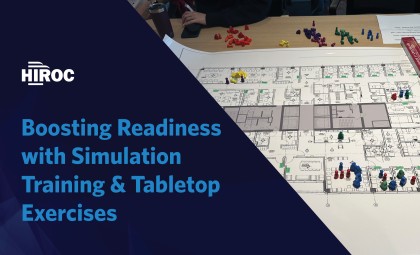Boosting Readiness with Simulation Training & Tabletop Exercises

Partnering with the healthcare community to share valuable learnings brings us joy, and so with the SimKIDS Simulation Symposium fast approaching in September, we wanted to check in with their team to hear more about the event. We had the pleasure of connecting with Alison Dodds, a member of the SimKIDS team.
Tell us a bit about yourself – where you work and what you do?
I’m a Simulation Educator at the Hospital for Sick Children, part of the SimKIDS team within the Learning Institute. My work focuses on designing and delivering simulation-based education and evaluation that enhances clinical and operational readiness, strengthens interprofessional collaboration, and promotes patient safety. I collaborate with teams across the organization to test new spaces, systems, and workflows ensuring that risks are identified and mitigated before they reach the bedside.
Simulation is more than a training tool—it’s a strategic approach to improving healthcare. It allows us to rehearse complex scenarios, refine protocols, and build team confidence. We’ve seen improvements in response times, communication, and safety outcomes. I’ve also led simulations that informed campus redevelopment and emergency preparedness, helping shape decisions around layout, equipment placement, workflow, processes, and team coordination. It’s a way to turn ideas into action before the stakes are real.
In your current role with simulation, what brings you joy?
I’m most energized by seeing practice evolve through simulation—when a team/individual walks away with new insights and applies them in real-world care. The engagement of learners, their curiosity, and the ripple effect on patient outcomes are deeply rewarding. It’s a reminder that even small changes in practice can lead to meaningful improvements.
You’re speaking at the upcoming SimKIDS event, and the topics are wide-ranging from AI research to Indigenous care. Tell us a bit about your talks and give us a sneak preview.
I’ll be sharing insights from a research initiative that compares simulation-acquired data with AI-driven methods for space planning and workflow optimization in healthcare. This work explores how simulation, humans and technology can work together to shape the future of hospital design and operational readiness.
I’ll also be co-presenting a tabletop simulation developed to support education around an updated smudging policy. This initiative promotes culturally safe care and helps staff engage meaningfully with Indigenous practices in healthcare settings.
One other thing you’ll be teaching at the event, not to mention something you do regularly, is talking about tabletop exercises. We at HIROC know how valuable these are and hope to see all HIROC Subscribers practicing.
In your opinion, why are tabletop exercises crucial?
Tabletop exercises (TTXs) offer a structured, lower-risk environment for teams to explore complex scenarios, test workflows, identify gaps in systems, and test mitigation strategies. They’re grounded in sound educational methodology and provide a practical way to surface issues that might otherwise go unnoticed. TTXs are a powerful tool for quality improvement, allowing organizations to refine processes before they’re put to the test in real life.
What have you heard participants tell you once you’ve done an exercise?
Participants often describe tabletop exercises as engaging, insightful, and surprisingly revealing. They consistently uncover operational issues that might otherwise go unnoticed, making them a valuable tool for proactive planning and system improvement.
Finally, what are some things others in healthcare (no matter their profession) can do to start their journey practicing and implementing tabletops at their organizations?
- Participate in a SimKIDS workshop to gain hands-on experience and foundational knowledge.
- Invest in faculty development to build internal capacity for designing and facilitating TTXs.
- Engage leadership early to align tabletop initiatives with organizational priorities and secure the support needed for sustainable implementation.
Where do you get your energy and motivation to keep doing the amazing things you do each day?
I’m inspired daily by the staff, patients, and families I work with. Their resilience and commitment to excellence drive me to keep exploring new approaches and improving care. I’m also fortunate to work alongside passionate colleagues and mentors in the simulation field who continually challenge and support innovation.
Thank you to Alison and the entire team at SimKIDS for your exceptional work in simulation.
HIROC recognizes the immense value behind simulation training and tabletop exercises at healthcare organizations, especially their role in boosting readiness.
Did you know HIROC has a resource on how to host a tabletop exercise? Check out our guide on Hosting A Successful Cyber Breach Tabletop Exercise.
We love hearing about Subscribers’ events and innovations so we can share your learnings with the rest of our healthcare community. If your organization has a story, reach out to us at [email protected].
